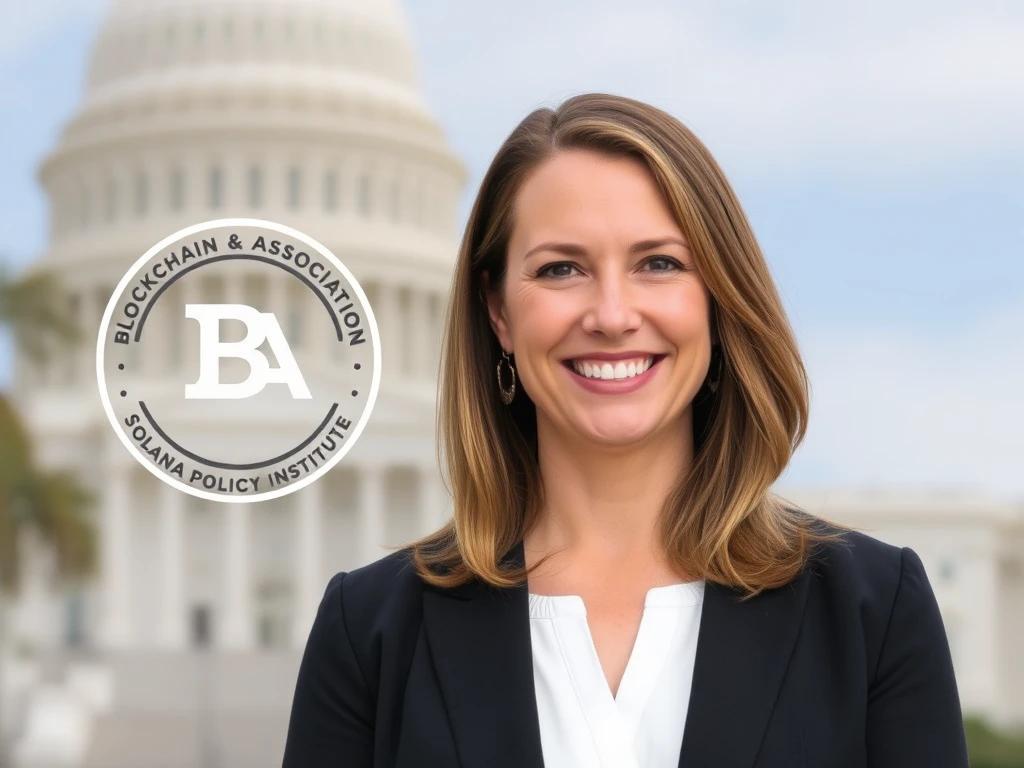Exclusive: Blockchain Association CEO’s Shocking Leap to Solana Policy Institute

In a stunning development that has sent ripples through the crypto advocacy world, Kristin Smith, the esteemed CEO of the Blockchain Association, is set to embark on a new chapter. After dedicating over six years to leading the charge at the Blockchain Association, Smith is making a bold move to spearhead the Solana Policy Institute as its president, effective May 19. What does this seismic shift mean for the future of cryptocurrency policy and crypto regulation in the United States?
Why is the Blockchain Association CEO Moving to the Solana Policy Institute?
Kristin Smith’s departure from the Blockchain Association, initially announced on April 1st, marks the end of an era for the organization. Her leadership has been instrumental in shaping the advocacy landscape for blockchain technology and digital assets. Now, she’s poised to bring her extensive expertise to the recently established Solana Policy Institute. While the official announcement from the Blockchain Association didn’t explicitly state the reasons behind this move, the timing and nature of the transition suggest a strategic pivot towards focusing on specific blockchain ecosystems and their unique policy needs.
The Solana Policy Institute, still in its nascent stages, is clearly making a power play by securing Smith’s leadership. This move underscores the growing importance of dedicated advocacy for specific blockchain technologies like Solana, especially as the regulatory landscape for cryptocurrencies continues to evolve rapidly. Could this be a sign of a more specialized approach to cryptocurrency advocacy, moving away from broader industry representation towards network-specific initiatives?
Kristin Smith: A Legacy of Crypto Advocacy
Before taking the helm at the Solana Policy Institute, Kristin Smith carved out an impressive career in both the public and private sectors. Her tenure as Blockchain Association CEO saw her navigate complex regulatory challenges, engage with policymakers, and champion the interests of the burgeoning crypto industry. Her background as Deputy Chief of Staff for former Montana Representative Denny Rehberg provided her with invaluable insights into the inner workings of Washington D.C., skills that undoubtedly served her well in the advocacy arena.
Smith’s move mirrors a similar transition by Miller Whitehouse-Levine, former CEO of the DeFi Education Fund, who also joined the Solana Policy Institute as CEO. This convergence of seasoned advocacy leaders at the Solana Policy Institute signals a serious commitment to shaping the policy narrative around Solana and its ecosystem. It begs the question: Are we witnessing the formation of a new powerhouse in Solana Policy Institute influencing digital asset regulations?
What Does This Mean for Solana and Crypto Regulation?
The Solana Policy Institute, under the presidency of Kristin Smith and the leadership of Miller Whitehouse-Levine, is explicitly focused on educating US policymakers about Solana. This targeted approach could be highly effective in fostering a more nuanced understanding of blockchain technology among regulators. Here’s what this strategic focus might entail:
- Dedicated Education: The institute will likely engage in direct outreach to policymakers, providing educational resources and briefings specifically tailored to Solana’s technology and its applications.
- Policy Shaping: By focusing on a specific blockchain, the institute can advocate for policies that are not only crypto-friendly in general but also conducive to the growth and innovation within the Solana ecosystem.
- Community Building: This move could galvanize the Solana community, providing a unified voice in policy discussions and strengthening the network’s position in the broader crypto landscape.
The Future of Cryptocurrency Advocacy: A Shift in Strategy?
Kristin Smith’s transition raises pertinent questions about the evolving strategies within cryptocurrency advocacy. Is the industry moving towards more specialized advocacy groups that champion specific blockchains, or will broader associations like the Blockchain Association continue to play a central role? It’s possible that both approaches will coexist, with specialized institutes like the Solana Policy Institute complementing the work of larger industry associations.
The move also highlights the increasing sophistication of the crypto industry’s engagement with policymakers. As regulations become more defined and nuanced, having dedicated experts focusing on specific technologies could be crucial for ensuring favorable policy outcomes. The coming months will be telling as we observe how the Solana Policy Institute, under Smith’s guidance, shapes the conversation around crypto regulation and the future of digital assets.
This is a developing story, and we will continue to update you as more information becomes available. Stay tuned for further insights into this pivotal shift in the crypto advocacy landscape.









